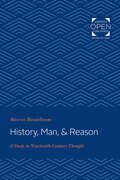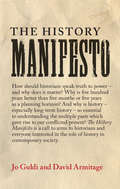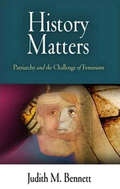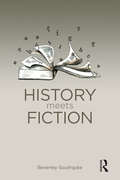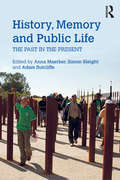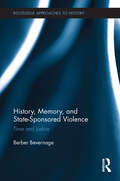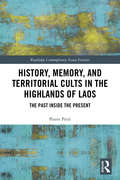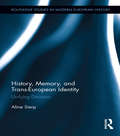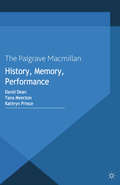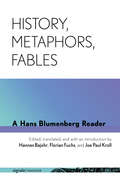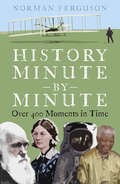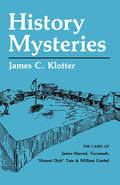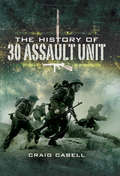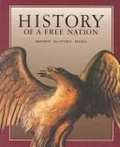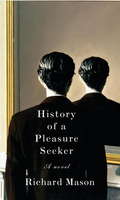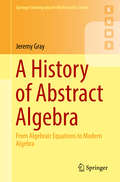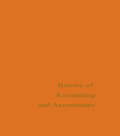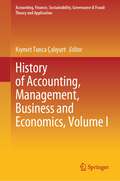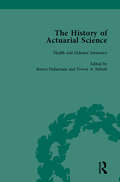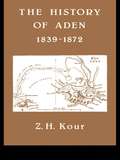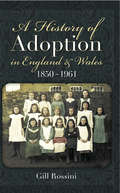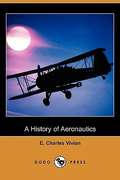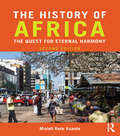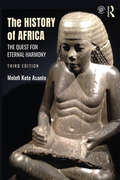- Table View
- List View
History, Man, and Reason: A Study in Nineteenth-Century Thought
by Maurice MandelbaumOriginally published in 1971. The purpose of this book is to draw attention to important aspects of thought in the nineteenth century. While its central concerns lie within the philosophic tradition, materials drawn from the social sciences and elsewhere provide important illustrations of the intellectual movements that the author attempts to trace. This book aims at examining philosophic modes of thought as well as sifting presuppositions held in common by a diverse group of thinkers whose antecedents and whose intentions often had little in common. After a preliminary tracing of the main strands of continuity within philosophy itself, the author concentrates on how, out of diverse and disparate sources, certain common beliefs and attitudes regarding history, man, and reason came to pervade a great deal of nineteenth-century thought. Geographically, this book focuses on English, French, and German thought. Mandelbaum believes that views regarding history and man and reason pose problems for philosophy, and he offers critical discussions of some of those problems at the conclusions of parts 2, 3, and 4.
The History Manifesto
by Jo Guldi David ArmitageHow should historians speak truth to power - and why does it matter? Why is five hundred years better than five months or five years as a planning horizon? And why is history - especially long-term history - so essential to understanding the multiple pasts which gave rise to our conflicted present? The History Manifesto is a call to arms to everyone interested in the role of history in contemporary society. Leading historians David Armitage and Jo Guldi identify a recent shift back to longer-term narratives, which they argue is vital for the future of historical scholarship and how it is communicated. This provocative and thoughtful book, published simultaneously in print and Open Access, makes an important intervention in the debate about the role of history and the humanities in a digital age. It will provoke discussion among policymakers, activists and entrepreneurs as well as ordinary listeners, viewers, readers, students and teachers.
History Matters
by Judith M. BennettWritten for everyone interested in women's and gender history, History Matters reaffirms the importance to feminist theory and activism of long-term historical perspectives. Judith M. Bennett, who has been commenting on developments in women's and gender history since the 1980s, argues that the achievement of a more feminist future relies on a rich, plausible, and well-informed knowledge of the past, and she asks her readers to consider what sorts of feminist history can best advance the struggles of the twenty-first century.Bennett takes as her central problem the growing chasm between feminism and history. Closely allied in the 1970s, each has now moved away from the other. Seeking to narrow this gap, Bennett proposes that feminist historians turn their attention to the intellectual challenges posed by the persistence of patriarchy. She posits a "patriarchal equilibrium" whereby, despite many changes in women's experiences over past centuries, women's status vis-à-vis that of men has remained remarkably unchanged. Although, for example, women today find employment in occupations unimaginable to medieval women, medieval and modern women have both encountered the same wage gap, earning on average only three-fourths of the wages earned by men. Bennett argues that the theoretical challenge posed by this patriarchal equilibrium will be best met by long-term historical perspectives that reach back well before the modern era. In chapters focused on women's work and lesbian sexuality, Bennett demonstrates the contemporary relevance of the distant past to feminist theory and politics. She concludes with a chapter that adds a new twist--the challenges of textbooks and classrooms--to viewing women's history from a distance and with feminist intent.A new manifesto, History Matters engages forthrightly with the challenges faced by feminist historians today. It argues for the radical potential of a history that is focused on feminist issues, aware of the distant past, attentive to continuities over time, and alert to the workings of patriarchal power.
History Meets Fiction (History: Concepts,Theories and Practice)
by Beverley C. SouthgateIs history factual, or just another form of fiction? Are there distinct boundaries between the two, or just extensive borderlands? How do novelists represent historians and history? The relationship between history and fiction has always been contentious and sometimes turbulent, not least because the two have traditionally been seen as mutually exclusive opposites. However, new hybrid forms of writing – from historical fiction to docudramas to fictionalised biographies – have led to the blurring of boundaries, and given rise to the claim that history itself is just another form of fiction. In his thought-provoking new book, Beverley Southgate untangles this knotty relationship, setting his discussion in a broad historical and philosophical context. Throughout, Southgate invokes a variety of writers to illuminate his arguments, from Dickens and Proust, through Virginia Woolf and Daphne du Maurier, to such contemporary novelists as Tim O’Brien, Penelope Lively, and Graham Swift. Anyone interested in the many meeting points between history and fiction will find this an engaging, accessible and stimulating read.
History, Memory and Public Life: The Past in the Present
by Adam Sutcliffe Anna Maerker Simon SleightHistory, Memory and Public Life introduces readers to key themes in the study of historical memory and its significance by considering the role of historical expertise and understanding in contemporary public reflection on the past. Divided into two parts, the book addresses both the theoretical and applied aspects of historical memory studies. ‘Approaches to history and memory‘ introduces key methodological and theoretical issues within the field, such as postcolonialism, sites of memory, myths of national origins, and questions raised by memorialisation and museum presentation. ‘Difficult pasts‘ looks at history and memory in practice through a range of case studies on contested, complex or traumatic memories, including the Northern Ireland Troubles, post-apartheid South Africa and the Holocaust. Examining the intersection between history and memory from a wide range of perspectives, and supported by guidance on further reading and online resources, this book is ideal for students of history as well as those working within the broad interdisciplinary field of memory studies.
History, Memory, and State-Sponsored Violence: Time and Justice (Routledge Approaches to History)
by Berber BevernageModern historiography embraces the notion that time is irreversible, implying that the past should be imagined as something ‘absent’ or ‘distant.’ Victims of historical injustice, however, in contrast, often claim that the past got ‘stuck’ in the present and that it retains a haunting presence. History, Memory, and State-Sponsored Violence is centered around the provocative thesis that the way one deals with historical injustice and the ethics of history is strongly dependent on the way one conceives of historical time; that the concept of time traditionally used by historians is structurally more compatible with the perpetrators’ than the victims’ point of view. Demonstrating that the claim of victims about the continuing presence of the past should be taken seriously, instead of being treated as merely metaphorical, Berber Bevernage argues that a genuine understanding of the ‘irrevocable’ past demands a radical break with modern historical discourse and the concept of time. By embedding a profound philosophical reflection on the themes of historical time and historical discourse in a concrete series of case studies, this project transcends the traditional divide between ‘empirical’ historiography on the one hand and the so called ‘theoretical’ approaches to history on the other. It also breaks with the conventional ‘analytical’ philosophy of history that has been dominant during the last decades, raising a series of long-neglected ‘big questions’ about the historical condition – questions about historical time, the unity of history, and the ontological status of present and past –programmatically pleading for a new historical ethics.
History, Memory, and Territorial Cults in the Highlands of Laos: The Past Inside the Present (Routledge Contemporary Asian Societies)
by Pierre PetitThis book captures the dynamics of history, memory, and territorial cults in Houay Yong, a Tai Vat village situated in the multiethnic highland frontier between Laos and Vietnam. By taking seriously the experiences of the villagers, it partakes in a broader movement to reintegrate highlanders and their agency into history at large. Based on comprehensive fieldwork research and the examination of colonial archives, this book makes accessible, for an English-speaking audience, untapped French archives on Laos and early publications on territorial cults written by French ethnologists. In so doing, it provides a balanced perspective, drawing from the fields of memory studies and classical historical research. Following a chronological approach stretching from the nineteenth century to the present, it extends narrative analysis through a comparative ethnography of territorial cults, a key component of the performative and material presentification of the past. Highly interdisciplinary in nature, History, Memory and Territorial Cults in the Highlands of Laos will be useful to students and scholars of anthropology, history, and religious studies, as well as Asian culture and society.
History, Memory, and Trans-European Identity: Unifying Divisions (Routledge Studies in Modern European History #23)
by Aline SierpThis book questions the presupposition voiced by many historians and political scientists that political experiences in Europe continue to be interpreted in terms of national history, and that a European community of remembrance still does not exist. By tracing the evolution of specific memory cultures in two successor countries of the Fascist/Nazi regime (Italy and Germany) and the impact of structural changes upon them, the book investigates wider democratic processes, particularly concerning the conservation and transmission of values and the definition of identity on different levels. It argues that the creation of a transnational European memory culture does not necessarily imply the erasure of national and local forms of remembrance. It rather means the creation of a further supranational arena where diverging memories can find their expression and can be dealt with in a different way. Through the triangulation of agents of memory construction, constraints and opportunities and actual portrayals of the past, this volume explores the difficulties faced by a multinational entity like the EU in reaching some kind of consensus on such a sensitive subject as history.
History, Memory, Performance
by David Dean Yana Meerzon Kathryn PrinceHistory, Memory, Performance is an interdisciplinary collection of essays exploring performances of the past in a wide range of trans-national and historical contexts. At its core are contributions from theatre scholars and public historians discussing how historical meaning is shaped through performance.
History, Metaphors, Fables: A Hans Blumenberg Reader (signale|TRANSFER: German Thought in Translation)
by Hans BlumenbergHistory, Metaphors, and Fables collects the central writings by Hans Blumenberg and covers topics such as on the philosophy of language, metaphor theory, non-conceptuality, aesthetics, politics, and literary studies. This landmark volume demonstrates Blumenberg's intellectual breadth and gives an overview of his thematic and stylistic range over four decades. Blumenberg's early philosophy of technology becomes tangible, as does his critique of linguistic perfectibility and conceptual thought, his theory of history as successive concepts of reality", his anthropology, or his studies of literature. History, Metaphors, Fables allows readers to discover a master thinker whose role in the German intellectual post-war scene can hardly be overestimated.
History Minute by Minute: Over 400 Moments in Time
by Norman FergusonAt what time was Guy Fawkes discovered underneath the Palace of Westminster? Just when was Einstein’s Theory of Relativity proved? What time was on the clock when Titanic sunk? When was President John F. Kennedy assassinated? All these questions and 400 more are answered in History Minute by Minute, breaking down history into a round-the-clock timeline of fascinating and vital moments from around the world. From battles and assassinations to crimes, deaths and disasters – and everything else that makes up our vivid and unique history – you will find that no minute lacks some significance. So, whether you want to find out what time an event happened or if anything noteworthy happened at the time of your birth, anniversary or the time on the clock right now, you are sure to delight in this quirky take on world history.
History Mysteries (New Books for New Readers)
by James C. KlotterFour true stories of unexplained deaths and disappearances from Kentucky&’s past. Historians are like detectives—and some historical events are like cold cases that haven&’t been solved yet. This concise, clearly written book presents the stories of four mysteries of Kentucky history: • The disappearance of James Harrod, who told his wife he was going hunting in 1792 and never returned • The unknown fate of &“Honest Dick&” Tate, the nineteenth-century Kentucky State Treasurer who ran off with a fortune in stolen funds • The battlefield death of Indian chief Tecumseh • The assassination of William Goebel, who died four days after being sworn in as governor In this enjoyable trip through the past, Kentucky State Historian James Klotter offers clues—but leaves the solutions to the reader.
The History of 30 Assault Unit: Ian Fleming's Red Indians
by Craig CabellThe Second World War spawned a plethora of crack special forces units (Long Range Desert Group, SAS, SBS, Phantom and Commandos) but 30 Assault Unit remains, even today, far more secretive and exclusive than the others. Formed by Ian Fleming, who was working for Naval Intelligence, 30 AUs mission was to penetrate and operate behind enemy lines, capture by whatever means necessary vital intelligence and feed it back to London where it could be assimilated and acted upon. This crack team of commandos included mavericks such as Patrick Dalzel-Job (generally regarded as the model for Flemings fictional secret agent 007), and less well known (despite their conspicuous bravery) figures such as Captains Huntingdon-Whiteley, Captain Martin-Smith. Lieutenant Commander Curtis and Lieutenant McFee. The author has trawled archives and interviewed veterans in order to piece together the history and record of this elusive special forces unit who fought with great distinction and achieved results disproportionate to their size.
History of a Free Nation
by Henry W. Bragdon Donald A. Ritchie Samuel P. MccutchenImagine a United States without computers, telephones, or automobiles, where women and most minorities cannot vote, a place where 8 of 10 people work on farms, and higher education is privilege reserved for the fortunate few.
History of a Free Nation
by Donald A. Ritchie Samuel P. Mccutchen Henry W BragdonBefore you start the hundreds of pages that follow--with their thousands of scenes, characters, and ideas--you have every right to ask some questions: So what? What of it? Why should I work hard at teaching myself history? There are many possible answers. Your teachers will have some; the authors of this book will have some. But think about this: you teach yourself history to give yourself certain gifts that nobody will ever be able to take away from you, no matter how long you live, no matter what happens to you.
History of a Pleasure Seeker
by Richard MasonFrom the acclaimed author of The Drowning People ("A literary sensation" --The New York Times Book Review) and Natural Elements ("A magnum opus" --The New Yorker), an opulent, romantic coming-of-age drama set at the height of Europe's belle époque, written in the grand tradition with a lightness of touch that is wholly modern and original. The novel opens in Amsterdam at the turn of the last century. It moves to New York at the time of the 1907 financial crisis and proceeds onboard a luxury liner headed for Cape Town. It is about a young man--Piet Barol--with an instinctive appreciation for pleasure and a gift for finding it. Piet's father is an austere administrator at Holland's oldest university. His mother, a singing teacher, has died--but not before giving him a thorough grounding in the arts of charm. Piet applies for a job as tutor to the troubled son of Europe's leading hotelier: a child who refuses to leave his family's mansion on Amsterdam's grandest canal. As the young man enters this glittering world, he learns its secrets--and soon, quietly, steadily, finds his life transformed as he in turn transforms the lives of those around him. History of a Pleasure Seeker is a brilliantly written portrait of the senses, a novel about pleasure and those who are in search of it; those who embrace it, luxuriate in it, need it; and those who deprive themselves of it as they do those they love. It is a book that will beguile and transport you--to another world, another time, another state of being.
A History of Abstract Algebra: From Algebraic Equations to Modern Algebra (Springer Undergraduate Mathematics Series)
by Jeremy GrayThis textbook provides an accessible account of the history of abstract algebra, tracing a range of topics in modern algebra and number theory back to their modest presence in the seventeenth and eighteenth centuries, and exploring the impact of ideas on the development of the subject. Beginning with Gauss’s theory of numbers and Galois’s ideas, the book progresses to Dedekind and Kronecker, Jordan and Klein, Steinitz, Hilbert, and Emmy Noether. Approaching mathematical topics from a historical perspective, the author explores quadratic forms, quadratic reciprocity, Fermat’s Last Theorem, cyclotomy, quintic equations, Galois theory, commutative rings, abstract fields, ideal theory, invariant theory, and group theory. Readers will learn what Galois accomplished, how difficult the proofs of his theorems were, and how important Camille Jordan and Felix Klein were in the eventual acceptance of Galois’s approach to the solution of equations. The book also describes the relationship between Kummer’s ideal numbers and Dedekind’s ideals, and discusses why Dedekind felt his solution to the divisor problem was better than Kummer’s. Designed for a course in the history of modern algebra, this book is aimed at undergraduate students with an introductory background in algebra but will also appeal to researchers with a general interest in the topic. With exercises at the end of each chapter and appendices providing material difficult to find elsewhere, this book is self-contained and therefore suitable for self-study.
A History of Accounting and Accountants
by Richard BrownFirst published in 1968. Inspired by the occurrence of the Fiftieth Anniversary of the incorporation of Accountants in Scotland—in which country the Chartered Accountant first saw the light — suggested the propriety of writing an account of the origin and growth of the profession while it was still possible to ascertain the facts and describe the circumstances with some degree of fulness. This book also includes a history of Accounts, Auditing, and Book-keeping; in short, to treat of Accounting— as well as Accountants—from the historic standpoint.
History of Accounting, Management, Business and Economics, Volume I (Accounting, Finance, Sustainability, Governance & Fraud: Theory and Application)
by Kıymet Tunca ÇalıyurtThis book brings together works written by academics from all over the world on all aspects of business history: accounting history, management history, economic history, audit history, tax history, financial history, and professional history. Writing, transferring and archiving historical knowledge allows future generations to take lessons from the past and make more informed decisions regardless of whether it is in politics, society, or business. "Historization" can also be seen as the first step of institutionalization for private and governmental companies, institutions, professionals, and states. Institutionally managed historical activities, decisions, and results are accepted as a very important reference about the company for decision-makers and stakeholders. Additionally, "historization" is used in the development and promotion of professions. Historization of professions such as certified public accountants, external auditors, internal auditors, economists, tax experts, certified fraud examiners, and managers nationally and internationally has the potential to educate and motivate new entrants to such roles. As such, this book is a valuable read for business historians, professionals in the field, academics, and students of business.
The History of Actuarial Science IX
by Steven HabermanA book which covers the key period in the history of actuarial science from the mid-17th century to the early 19th century. There are reprints of the most important treatises, pamphlets, tables and writings which trace the development of the actuarial industry.
The History of Aden
by Dr Z Kour Z.H. KourFirst Published in 1980. Routledge is an imprint of Taylor & Francis, an informa company.
A History of Adoption in England and Wales 1850- 1961
by Gill RossiniAdoption is one of the most emotive and complex subjects in social and family history. Gill Rossini's social history of adoption between 1850 and 1961 uncovers the perspectives of all those concerned in adoption: children, birth relatives, adoptive families, and all the agencies and organisations involved. Rossini charts the transformation of the adoption process from a chaotic informal arrangement to a legal procedure. Set against the backdrop of the moral, cultural, and legal climate of the times, the contemporary voices of those who played a part in an adoption give real insights into this often turbulent period in their lives. Discover how shocking stories of baby farmers and unwanted orphans fuelled the campaign for change, and hear previously untold stories.For those who wish to conduct their own research into an adoption, Rossini has compiled a comprehensive guide to resources.
The History of Africa: The Quest for Eternal Harmony
by Molefi Kete AsanteThere is a paradox about Africa: it remains a subject that attracts considerable attention yet rarely is there a full appreciation of its complexity. African historiography has typically consisted of writing Africa for Europe--instead of writing Africa for itself, as itself, from its own perspectives. The History of Africa redresses this by letting the perspectives of Africans themselves take center stage. Authoritative and comprehensive, this book provides a wide-ranging history of Africa from earliest prehistory to the present day--using the cultural, social, political, and economic lenses of Africa as instruments to illuminate the ordinary lives of Africans. The result is a fresh survey that includes a wealth of indigenous ideas, African concepts, and traditional outlooks that have escaped the writing of African history in the West. The new edition includes information on the Arab Spring, the rise of FrancAfrica, the presence of the Chinese in Africa, and the birth of South Sudan. The chapters go up to the present day, addressing US President Barack Obama's policies toward Africa. A new companion website provides students and scholars of Africa with access to a wealth of supporting resources for each chapter, including images, video and audio clips, and links to sites for further research. This straightforward, illustrated, and factual text allows the reader to access the major developments, personalities, and events on the African continent. This groundbreaking survey is an indispensable guide to African history.
The History of Africa: The Quest for Eternal Harmony
by Molefi Kete AsanteAuthoritative and comprehensive, The History of Africa provides an accessible narrative from earliest prehistory to the present day, with unusual attention paid to the ordinary lives of Africans. This survey includes a wealth of indigenous ideas, African concepts, and traditional outlooks that have escaped the writing of African history in the West. The fully updated new edition includes information on the recent conflicts in Libya and the Sudan, as well as additional content on the experiences and contributions of women. A companion website offers a wealth of supporting resources for each chapter, including new historic maps, primary sources, video and audio clips, and links to sites for further research. Richly illustrated and clearly written, this volume is an indispensable introduction to the major developments, personalities, and events that have shaped the history of the African continent.
